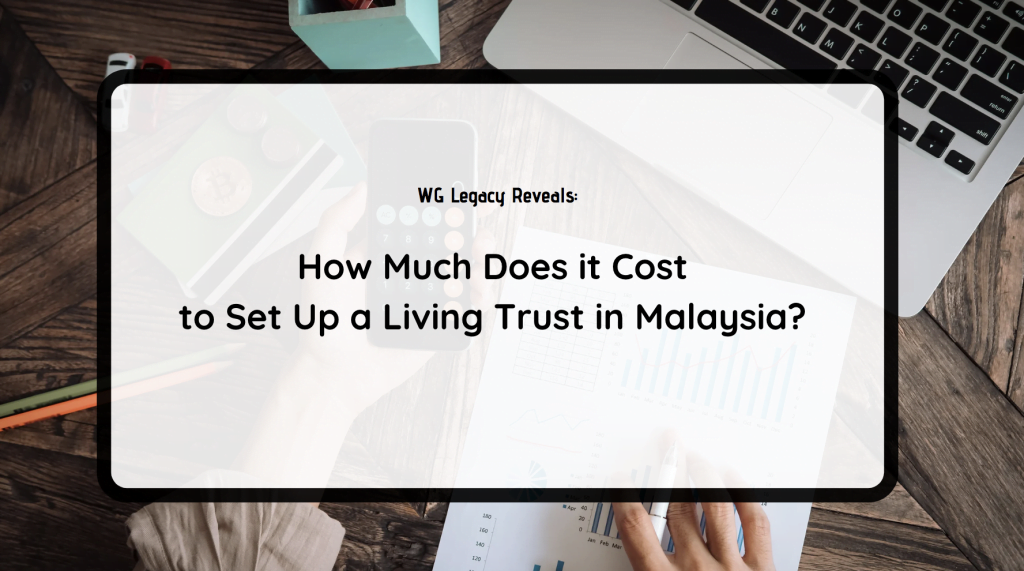Here is a quick recap:
Essentially, a living trust is likened to you entrusting ‘a friend’ to hold, safeguard and manage your money on behalf of you and your loved ones. This is so that it is possible for your money to be immediately delivered to your family members and yourself, either in one-lump sum or in multiple installments, by your friend, in the event of you losing the ability to manage your money due to unfortunate events such as death, disability, disease, disappearance, or bankruptcy.
So if I’m in need of a friend like this and I ask you to take care of a portion of my money, let’s say RM 100,000, on behalf of me and my family, would you be glad to faithfully do me such a favor for free?
Most decent people wouldn’t.
Some people may say yes to it. But in reality, they would misuse the money and profit themselves. This happens even among family members and relatives. As I write, it is not easy to find an individual friend who is that ‘trustworthy’. Instead of an individual friend, it is more practical to engage a Trust Company to handle our assets. In this context, the ‘friend’ here refers to a Trust Company.
It is more practical because a Trust Company is regulated by the authorities and is required to be highly compliant with various laws and acts in a nation. Hence, a Trust Company offers us assurance that they can safeguard wealth faithfully. So in return, I think it is fair for us to reward such faithfulness with a premium. That premium is our fees. Basically, there are three types of fees when setting a living trust in Malaysia. They are as follows:
#1: Set Up Fees
First, you need an instruction guide to inform your trustee as to what he should do to safeguard and manage your money. To add onto its assurance, it is best to make this instruction guide official and recognised in Malaysia. By doing so, you could be rest assured that your ‘friend’ will carry out these instructions as listed in your instruction guide. Otherwise, you could bring your ‘friend’ to court.
That instruction guide is known as the trust deed of your living trust.
This will be prepared professionally by an estate planner and drafted by the legal department from the Trust Company and thus, requires a fee.
The amount of fee is dependent on the effort to prepare your trust deed, which in turn, depends on your list of instructions, which once again, will be according to your own objectives. Thus, the more instructions you want to include in your trust deed, the more fees it would require. For instance, a simple living trust set up to benefit 3 to 5 people would cost less as compared to one that is meant for a multi-generational family consisting of 10 people.
But typically, for most Malaysian families, it is fair to budget somewhere around RM 3,000 – RM 5,000 in one-time cost to set up a living trust.
#2: Annual Trust Management Fees
Generally, a living trust is set up for years. It is long-term.
So, as a token of appreciation to safeguard our money, we shall visit our ‘friend’ each year and reward him with ‘coffee money’, which is known as trust management fees. Generally, the fee to be charged will be based on a percentage of our capital entrusted to this ‘trustee’, which ranges between 0.5%-1.5% a year presently depending on which Trust Company you choose.
Here is a question.
If you placed RM 500,000 into your living trust, where its annual ‘coffee money’ is 1% per year, does it mean that your trust will have RM 495,000 after 1 year?
Not necessarily.
This is because you could instruct your ‘trustee’ to invest your money inside with a trust deed. Here for the sake of our discussion, let’s assume that you prefer to retain the money inside your trust for as long as you are healthy and alive. Thus in your case, you could choose any of the following below:
1. FDs or Money Market Funds
You can instruct your trustee to put your money in FDs or Money Market Funds (MMF). Of which, the interest income can be used to pay for the ‘coffee money’ of your living trust.
2. Financial Advisers (FA)
You may appoint any of the approved financial advisers (FA) as the manager of your money put inside your living trust. Your trustee can be instructed to then park your money with the appointed FA, thus, allowing the FA to invest the money on behalf of you.
3. Structured Investments (SI)
Today, there are Trust Company that offer to invest the capital parked within on behalf of you for annual returns. They would include such instructions in the templated trust deed prepared by their legal team. I discovered that the annual trust returns are projected somewhere between 6% – 7%, depending on the trustee of your preference. Here, I think it is crucial to take note of the underlying investment of this structured investment (list of assets stated in these templated trust deeds) before proceeding with any one of them.
In essence, your money placed in your living trust could be invested so that you could use the profits generated to pay for the 0.5%-1.5% in annual fees.
#3: Revocation Fees
This refers to the preparation of accounts and legal documents to close, revoke, or cancel the living trust. They would arise if the money placed within had been almost or fully exhausted or if you choose to revoke your living trust. In general, this should cost around RM 1,000 – RM2,000 in a one-time fee.
Conclusion: Why Engage an Estate Planner?
In short, the role of an estate planner is to first understand your needs, worries, concerns and objectives. From them, the estate planner could craft out a highly customized solution to address these needs efficiently.
Announcement:
Presently, we have a promotion, where the fees to write or update a will and its lifetime custody worth RM 1,550, would be waived in full upon successful setup of a living trust with WG Legacy.
This promotion would end by 31 August 2022 and you may subscribe to this by first booking yourself a 30-minute consultation session below:




